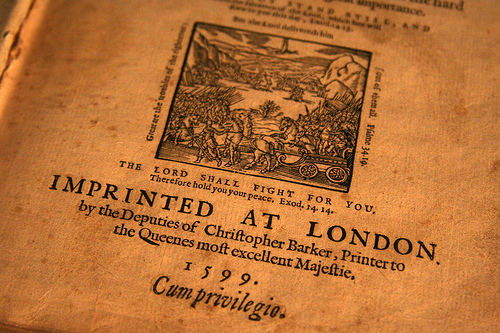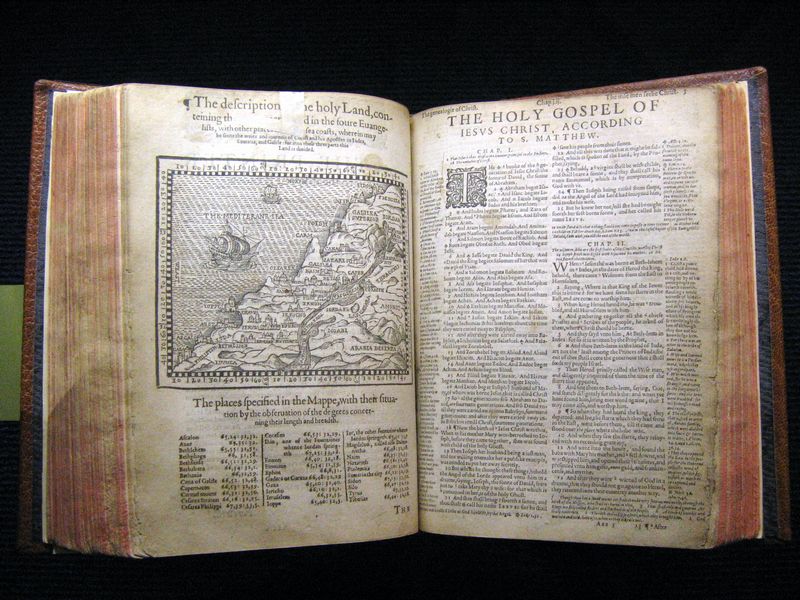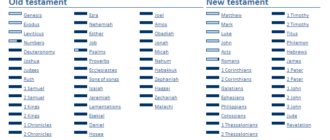
Exploring the Geneva Bible: A Rich Heritage Often Overlooked
In the realm of religious texts, there is one particular translation that stands out as a nearly forgotten heritage: the Geneva Bible. This remarkable piece of literature, first published in 1560, holds a significant place in the history of Christianity. Despite its historical and cultural importance, the Geneva Bible has been overshadowed by other translations throughout the centuries.
The Geneva Bible was a product of its time, created during the Protestant Reformation. It was the work of a group of English scholars who sought to provide an accessible and accurate translation of the Bible for the common people. This translation was not only a religious text, but also a political statement, as it challenged the authority of the Catholic Church and the monarchy.
What sets the Geneva Bible apart from other translations is its unique features. It was the first English Bible to include chapter and verse divisions, making it easier for readers to navigate and reference specific passages. Additionally, it contained extensive study notes and commentary, providing readers with a deeper understanding of the text. These features made the Geneva Bible an invaluable resource for individuals seeking to deepen their knowledge of scripture.
Despite its many virtues, the Geneva Bible gradually fell out of favor as newer translations, such as the King James Version, gained popularity. Over time, the Geneva Bible became a nearly forgotten heritage, overshadowed by its successors. However, its impact on the development of the English language and the spread of Protestantism cannot be understated. The Geneva Bible remains a testament to the power of translation and the importance of accessibility in religious texts.
The Origins of the Geneva Bible
The Geneva Bible holds a significant place in the history of religious texts. It was one of the earliest English translations of the Bible and played a crucial role in the development of the English language and Protestant theology. The geneva Bible was first published in the 16th century in Geneva, Switzerland, hence its name.
The geneva Bible was not only a translation of the Bible into English, but it also included extensive study notes and commentaries. These annotations were written by the prominent Protestant scholars of the time, such as John Calvin, Theodore Beza, and John Knox. The geneva Bible was known for its clear and concise language, making it accessible to a wide range of readers.
One of the reasons for the popularity of the geneva Bible was its emphasis on personal study and interpretation of the scriptures. The study notes provided in the geneva Bible encouraged readers to engage with the text and develop their understanding of the Bible’s teachings. This approach was in contrast to the Catholic Church’s tradition of relying on the clergy for interpretation.
The geneva Bible also had a significant impact on the English language. Many phrases and expressions that are commonly used today originated from the geneva Bible. For example, phrases like “the powers that be” and “a thorn in the flesh” can be traced back to the geneva Bible. This influence on the English language further solidifies the geneva Bible’s place in history.
Although the geneva Bible is nearly forgotten today, its legacy lives on in the translations that followed, such as the King James Version. The geneva Bible’s emphasis on personal study and its clear language set a precedent for future translations, making it a vital part of the English-speaking world’s religious heritage.
The Impact of the Geneva Bible
The Geneva Bible, although nearly forgotten in modern times, had a significant impact on the religious and cultural landscape of its time. This English translation of the Bible, first published in 1560, played a crucial role in shaping the Protestant Reformation and the development of the English language.
One of the key features of the Geneva Bible was its extensive study notes and annotations, which made it a valuable resource for individual study and interpretation of the scriptures. These notes provided readers with a deeper understanding of the text and helped to foster a sense of personal engagement with the Bible.
The Geneva Bible also had a profound influence on the English language. Its translators made significant efforts to create a clear and accessible translation that could be easily understood by the common people. As a result, many phrases and expressions from the Geneva Bible found their way into everyday English usage.
Furthermore, the Geneva Bible played a crucial role in the spread of Protestantism, both in England and beyond. Its compact size and affordable price made it accessible to a wide range of people, and its emphasis on personal study and interpretation helped to empower individuals in their faith.
In addition, the Geneva Bible was also known for its strong Protestant and anti-monarchical bias. This made it a popular choice among Puritans and other dissenting groups who were critical of the established Church of England and the monarchy.
In conclusion, although the Geneva Bible may have been nearly forgotten in modern times, its impact on religious and cultural history cannot be underestimated. Its study notes and annotations, influence on the English language, and role in the spread of Protestantism all contributed to its significance in shaping the religious and cultural landscape of its time.
The Translation Process
The translation process of the Geneva Bible was a monumental task that required the collaboration of scholars and theologians. It was a meticulous and arduous process that aimed to create an accurate and accessible version of the Bible for the English-speaking world.
First, a team of scholars carefully studied the original Hebrew and Greek texts of the Bible, comparing different versions and consulting commentaries and other sources. They sought to understand the original meaning of the text and ensure its faithful translation.
Next, the scholars worked together to translate the text into English. They aimed to capture the nuances and richness of the original language while making it understandable to the common people. This involved making difficult decisions about word choice, sentence structure, and the use of idioms and figures of speech.
Once the translation was complete, it underwent a rigorous process of review and revision. Other scholars and theologians examined the translation, providing feedback and suggestions for improvement. This collaborative effort ensured the accuracy and quality of the final product.
The Geneva Bible’s translation process was not only a scholarly endeavor but also a deeply religious one. The translators believed that the Bible was the inspired word of God and approached their task with reverence and devotion. They saw their work as a way to preserve and transmit the Christian heritage to future generations.
The Features of the Geneva Bible
The Geneva Bible, a nearly forgotten heritage, is a significant version of the Bible that played a crucial role in shaping the religious landscape of the English-speaking world. This Bible, first published in 1560, was the product of the English exiles who sought refuge in Geneva during the reign of Queen Mary I of England.
One of the notable features of the Geneva Bible is its extensive commentary and study notes. Unlike previous versions, which were primarily focused on the text itself, the Geneva Bible included detailed explanations and interpretations of the scriptures. These annotations were aimed at helping readers understand the meaning and context of the biblical passages, making the Geneva Bible a valuable tool for individual study and spiritual growth.
Another distinctive feature of the Geneva Bible is its emphasis on accessibility. The translators of this version sought to make the scriptures easily understandable for the common people. To achieve this, they used plain language and simple sentence structures, making the Geneva Bible more accessible to a wider audience. This focus on clarity and readability contributed to the widespread popularity of the Geneva Bible during the Elizabethan era.
In addition to its commentary and accessibility, the Geneva Bible also introduced several innovative features. One of these features was the inclusion of chapter summaries at the beginning of each chapter. These summaries provided a brief overview of the content, helping readers navigate through the text and grasp the main ideas. The Geneva Bible also introduced verse numbering, making it easier to reference specific passages and facilitating cross-referencing between different parts of the Bible.
Although the Geneva Bible has been largely forgotten in modern times, its impact and influence on subsequent English translations of the Bible cannot be overstated. It served as a crucial link between the earlier translations, such as the Tyndale Bible, and the later King James Version. The Geneva Bible’s features of commentary, accessibility, and innovative formatting set a precedent for future translations, making it an important part of the English-speaking world’s religious heritage.
The Influence on English Literature
The forgotten Geneva Bible has had a significant impact on English literature throughout history. This unique heritage, with its rich biblical text, has shaped the language and themes of numerous literary works.
Many renowned writers and poets drew inspiration from the Geneva Bible, using its language and ideas to create their own masterpieces. The powerful words and vivid imagery found in this Bible influenced the works of William Shakespeare, John Milton, and John Bunyan, among others.
The Geneva Bible’s influence can be seen in Shakespeare’s plays, where biblical references and themes are often present. In “Macbeth,” for example, the concept of guilt and divine retribution echoes the biblical teachings found in the Geneva Bible.
Similarly, John Milton’s epic poem “Paradise Lost” draws heavily from the Geneva Bible’s interpretation of the story of Adam and Eve. Milton’s exploration of themes such as temptation, sin, and redemption reflects the influence of this forgotten heritage.
John Bunyan, a Christian writer and preacher, also drew inspiration from the Geneva Bible. His famous allegorical work “The Pilgrim’s Progress” explores the journey of a Christian believer, drawing on biblical imagery and themes that can be traced back to the Geneva Bible.
Overall, the forgotten Geneva Bible’s impact on English literature cannot be underestimated. Its language, ideas, and themes continue to resonate in countless literary works, making it an essential part of our cultural and literary heritage.
The Geneva Bible and the Pilgrims
The Geneva Bible played a significant role in the lives of the Pilgrims, a group of English separatists who fled to the Netherlands in the early 17th century. This translation of the Bible, first published in 1560, became their primary source of religious guidance and inspiration during their time in exile.
The Pilgrims, seeking religious freedom, found solace and strength in the pages of the Geneva Bible. This version, translated by English exiles in Geneva, Switzerland, emphasized the authority of individual believers and the importance of personal faith. Its footnotes and commentary provided a deeper understanding of the scriptures, empowering the Pilgrims to interpret the Bible for themselves.
The Geneva Bible’s influence on the Pilgrims extended beyond their time in the Netherlands. When they eventually set sail on the Mayflower to establish a new colony in America, they brought with them their beloved Geneva Bibles. These compact and portable editions served as a spiritual compass and a reminder of their shared beliefs and mission.
The Pilgrims’ commitment to the Geneva Bible reflects their determination to preserve their religious heritage and maintain their distinct identity. In a time of religious turmoil and persecution, this forgotten heritage played a crucial role in shaping the Pilgrims’ values and convictions, ultimately leading to the establishment of the Plymouth Colony and the enduring legacy of religious freedom in America.
The Geneva Bible in the New World
The Geneva Bible, with its rich heritage and historical significance, played a crucial role in the establishment of the New World. As the Pilgrims and Puritans set sail for America in the early 17th century, they brought with them this treasured bible, which had become nearly forgotten in its country of origin.
The Geneva Bible, first published in 1560, was a groundbreaking translation that made the scriptures accessible to the common people. Its annotations and commentary provided a deep understanding of the biblical text and its relevance to everyday life. This bible became immensely popular among the English-speaking Protestants and was widely used during the reign of Queen Elizabeth I.
When the Pilgrims and Puritans arrived in America seeking religious freedom, they carried with them a copy of the Geneva Bible. This bible served as a guide and source of inspiration for the early settlers as they established their communities and built a new nation. Its teachings and principles influenced the formation of laws and governance, shaping the foundation of American society.
The Geneva Bible’s impact on the New World can be seen in various aspects of American culture. Its emphasis on individual responsibility, self-governance, and the pursuit of religious freedom laid the groundwork for the values that would later become central to the American identity. The Geneva Bible also played a significant role in shaping the English language, as its phrases and expressions found their way into the writings and speeches of the early American leaders.
Although the Geneva Bible eventually fell out of favor as newer translations emerged, its legacy in the New World remains. As we explore the history of America, it is important to remember the role that this nearly forgotten bible played in shaping the ideals and principles upon which the nation was built.
The Decline of the Geneva Bible
Despite its rich heritage and significant impact on the English-speaking world, the Geneva Bible has largely been forgotten in modern times. Once a staple in many households, this influential translation of the Bible is now nearly absent from bookshelves and religious gatherings.
One of the main reasons for the decline of the Geneva Bible is the rise of other popular translations, such as the King James Version. While the Geneva Bible was highly regarded for its accuracy and readability, the King James Version gradually gained popularity and eventually became the dominant English translation. As a result, the Geneva Bible was pushed to the sidelines and its influence diminished.
Another factor contributing to the near-forgotten status of the Geneva Bible is the changing religious landscape. With the emergence of new denominations and the proliferation of different translations, the Geneva Bible lost its prominence and relevance. People began to gravitate towards translations that aligned with their specific beliefs and preferences, leaving the Geneva Bible behind.
Furthermore, advancements in technology and the widespread availability of digital versions of the Bible have also played a role in the decline of the Geneva Bible. With the convenience of accessing various translations on smartphones, tablets, and computers, many individuals no longer feel the need to own a physical copy of the Geneva Bible.

Despite its nearly forgotten status, the Geneva Bible remains an important part of the history of the English Bible. Its impact on the English language, literature, and religious thought cannot be overlooked. While it may no longer be as widely recognized or utilized as it once was, the Geneva Bible still holds a significant place in the development of the Bible in English.
The Rediscovery of the Geneva Bible
The Geneva Bible, once a nearly forgotten heritage, has experienced a remarkable rediscovery in recent years. This historic Bible, first published in 1560, holds a significant place in the history of English translations of the Bible. Despite its importance, the Geneva Bible was overshadowed by other versions, such as the King James Version, for many centuries.
However, in the past few decades, there has been a renewed interest in the Geneva Bible. Scholars and enthusiasts alike have recognized its unique contributions to biblical scholarship and its influence on subsequent translations. The Geneva Bible was the first English Bible to include extensive study notes, making it a valuable tool for understanding the text in its historical and cultural context.
One of the reasons for the rediscovery of the Geneva Bible is its role in shaping the religious and political landscape of its time. This Bible was the preferred version of many Protestant reformers, including John Calvin and John Knox, and it played a crucial role in the spread of Protestant ideas across Europe. Its notes and commentary reflected the theological perspectives of its translators, making it an important resource for understanding the Reformation era.
In addition to its historical significance, the Geneva Bible also stands out for its literary qualities. The translators of the Geneva Bible were not only concerned with accuracy, but also with creating a readable and accessible text. They made use of poetic language and rhetorical devices to enhance the beauty and clarity of the biblical text. This attention to style and language sets the Geneva Bible apart from other translations of its time.
The rediscovery of the Geneva Bible has led to its republication and widespread availability in modern times. Scholars and readers now have the opportunity to engage with this important piece of religious and literary history. The Geneva Bible reminds us of the rich heritage of English translations and the role they played in shaping our understanding of the Bible and its teachings.
The Significance of the Geneva Bible Today
The Geneva Bible holds a forgotten heritage that is of great significance even in the present day. This historic translation of the Bible played a crucial role in shaping religious and cultural movements during the English Reformation. Its impact can still be felt today, as it has influenced subsequent translations and versions of the Bible.
One of the key reasons for the significance of the Geneva Bible lies in its accessibility. At a time when the Roman Catholic Church held a monopoly on the Latin Vulgate Bible, the Geneva Bible provided an English translation that was easily readable and understandable for the common people. This allowed individuals to engage with the text and develop their own interpretations, contributing to the spread of Protestant ideas and the growth of religious freedom.
The Geneva Bible also stands out for its extensive study notes and commentary. This feature made it more than just a translation but also a valuable educational tool. The notes provided insights into the text, explained difficult passages, and offered theological explanations. This emphasis on study and interpretation encouraged a deeper understanding of the Bible and helped shape the religious beliefs of its readers.
Furthermore, the Geneva Bible had a significant influence on the English language itself. It introduced numerous phrases and expressions that have become part of everyday English usage. For example, phrases like “a leopard cannot change its spots” and “the blind leading the blind” originated from the Geneva Bible. This linguistic impact demonstrates the lasting legacy of this forgotten Bible translation.
In conclusion, the Geneva Bible holds a forgotten heritage that remains significant today. Its accessibility, study notes, and linguistic influence have contributed to its lasting impact. This Bible translation played a crucial role in shaping religious and cultural movements during the English Reformation, and its influence can still be seen in subsequent translations and in everyday English language usage.
The Geneva Bible and the Protestant Reformation
The Geneva Bible holds a significant place in the history of the Protestant Reformation. It was during this period of religious upheaval in the 16th century that the Geneva Bible emerged as a powerful tool for spreading the ideas of the Reformation.
Produced by English Protestant exiles in Geneva, Switzerland, the Geneva Bible was first published in 1560. It quickly gained popularity among English-speaking Protestants, becoming the most widely read and influential English Bible of its time.
One of the key features of the Geneva Bible was its extensive study notes and commentary, which provided readers with a deeper understanding of the biblical text. These study notes were written by leading Protestant scholars of the time, such as John Calvin and John Knox, and they played a crucial role in shaping the theological beliefs of the Protestant movement.
The Geneva Bible also played a significant role in shaping the English language. Its translation was known for its clarity and accessibility, making it accessible to a wider audience. Many of the phrases and expressions found in the Geneva Bible have become deeply ingrained in the English language, influencing subsequent translations and literary works.
Despite its historical significance, the Geneva Bible has been largely overshadowed by the King James Version, which was published over 50 years later. However, its impact on the Protestant Reformation and its contribution to the development of the English language cannot be overlooked. The Geneva Bible stands as a nearly forgotten heritage, a testament to the enduring legacy of the Protestant Reformation.
The Geneva Bible and the English Reformation
The Geneva Bible played a significant role in the English Reformation, which was a period of religious and political upheaval in England during the 16th century. This translation of the Bible was instrumental in spreading Protestant ideas and challenging the authority of the Catholic Church.
The Geneva Bible was first published in 1560 by English Protestant exiles in Geneva, Switzerland. It quickly gained popularity among English Protestants due to its clear and accessible language, as well as its extensive study notes and annotations. These study notes provided readers with a deeper understanding of the biblical text and helped to promote Protestant teachings.
During the English Reformation, the Geneva Bible became the preferred translation among Puritans and other Protestant groups. Its emphasis on individual interpretation and personal study of the Bible aligned with the Protestant belief in the priesthood of all believers. This challenged the Catholic Church’s authority and paved the way for greater religious freedom and the establishment of Protestant churches in England.
The Geneva Bible also played a role in shaping the English language. Its influence can be seen in the language and phrasing of later English translations, including the King James Version. Many familiar phrases and expressions in English literature have their roots in the Geneva Bible, further highlighting its lasting impact on English culture and heritage.
The Geneva Bible and the King James Bible
The Geneva Bible and the King James Bible are two significant contributions to the heritage of English Bible translations. While the Geneva Bible is nearly forgotten today, it played a crucial role in shaping the religious and cultural landscape of England and America.
The Geneva Bible, first published in 1560, was a product of the English Reformation and was widely used by English-speaking Protestants. It was the first English Bible to be translated directly from the original Hebrew and Greek texts, and it included extensive study notes and annotations to help readers understand the text. The Geneva Bible became popular among the Puritans and was even brought to America by the Pilgrims on the Mayflower.
However, the Geneva Bible’s influence started to wane in the early 17th century when a new translation, the King James Bible, was commissioned. The King James Bible, also known as the Authorized Version, was published in 1611 and quickly became the standard English Bible. It was commissioned by King James I of England and aimed to create a translation that would be accepted by both the Puritans and the Church of England.
The King James Bible borrowed heavily from the Geneva Bible, using its translation as a foundation and incorporating many of its study notes and annotations. However, it also made some significant changes, particularly in the language and style of the text. The King James Bible is known for its poetic and majestic language, which has had a lasting impact on the English language and literature.
While the Geneva Bible may have been overshadowed by the King James Bible, its legacy can still be seen in the various English translations that followed. Its emphasis on study notes and annotations influenced future Bible translations, and its commitment to translating directly from the original texts set a precedent for future translators. The Geneva Bible may be nearly forgotten today, but its impact on the English-speaking world is undeniable.
The Geneva Bible and the Development of English
The Geneva Bible, a nearly forgotten heritage, played a significant role in the development of the English language. This translation of the Bible, which was first published in 1560, had a profound impact on the English language and literature.
One of the most notable aspects of the Geneva Bible was its use of everyday language. Unlike previous translations, which were often written in Latin or other scholarly languages, the Geneva Bible was translated into English, making it accessible to a wider audience. This helped to popularize the English language and contributed to its development as a literary and cultural medium.
Furthermore, the Geneva Bible introduced many new words and phrases into the English language. Its translators made use of vernacular English, incorporating words and phrases that were commonly used by the people of the time. This not only enriched the English vocabulary but also helped to standardize the language and establish it as a distinct linguistic entity.
In addition to its linguistic contributions, the Geneva Bible also had a significant impact on the development of English literature. Many of the phrases and idioms found in the Bible became ingrained in the English language and were subsequently used by writers and poets. The influence of the Geneva Bible can be seen in the works of renowned English authors such as William Shakespeare, John Milton, and John Bunyan.
In conclusion, the Geneva Bible, despite being nearly forgotten, left a lasting legacy on the English language. Its use of everyday language, introduction of new words and phrases, and influence on English literature all contributed to the development and evolution of the English language as we know it today.
The Legacy of the Geneva Bible
The Geneva Bible, although nearly forgotten in modern times, holds a significant place in the history of Christianity. This English translation of the Bible was first published in Geneva in 1560 and quickly became popular among Protestants. Its impact on English literature and the development of the English language cannot be overlooked.
One of the most notable aspects of the Geneva Bible is its extensive commentary. The translation was accompanied by detailed notes and annotations, providing readers with valuable insights into the text. These commentaries helped to foster a deeper understanding of the Bible and its teachings, making it an invaluable resource for scholars and theologians.
The Geneva Bible also played a crucial role in shaping the religious and political landscape of its time. It was the Bible of choice for many of the early Pilgrims who settled in America, and its influence can be seen in the founding documents of the United States. The Geneva Bible’s emphasis on individual interpretation and personal responsibility before God laid the groundwork for the principles of religious freedom and democracy that are cherished today.
Furthermore, the Geneva Bible’s impact on English literature cannot be overstated. It was the version of the Bible that was most widely read and quoted by writers such as William Shakespeare and John Milton. Its language and phrasing permeated the works of these literary giants, leaving an indelible mark on the English literary tradition.
In conclusion, the legacy of the Geneva Bible is far from forgotten. Its impact on religious, political, and literary spheres is undeniable. This forgotten heritage deserves to be rediscovered and celebrated for its contribution to the development of Christianity and the English language.
FAQ:
What is the Geneva Bible?
The Geneva Bible is a historically significant English translation of the Bible that was first published in 1560. It was a popular version of the Bible during the Protestant Reformation and had a significant impact on English religious and literary culture.
Who translated the Geneva Bible?
The Geneva Bible was translated by a group of English scholars who had fled to Geneva, Switzerland, during the reign of Queen Mary I of England. The translation was led by William Whittingham, and other contributors included Myles Coverdale, Christopher Goodman, and Anthony Gilby.
Why was the Geneva Bible important?
The Geneva Bible was important because it was the first English Bible to be translated directly from the original Hebrew and Greek texts. It was also the first Bible to include extensive study notes, cross-references, and other aids to help readers understand the text. It was widely read and influential, and it played a key role in shaping the English language and religious thought during the 16th and 17th centuries.
What were some of the features of the Geneva Bible?
The Geneva Bible had several distinctive features, including study notes that provided explanations and interpretations of the text, cross-references that connected related passages, and marginal notes that offered alternative translations and other helpful information. It also included woodcut illustrations and maps, as well as a system of chapter and verse divisions that made it easier to navigate and study the Bible.
Why did the Geneva Bible fall out of favor?
The Geneva Bible fell out of favor for several reasons. One reason was the rise of the King James Version of the Bible, which became the authorized version of the Church of England in 1611. Another reason was the political and religious changes that took place in England during the 17th century, including the English Civil War and the Restoration. The Geneva Bible was associated with Puritanism and the Parliamentarians, and it was seen as subversive and radical by the ruling authorities.





